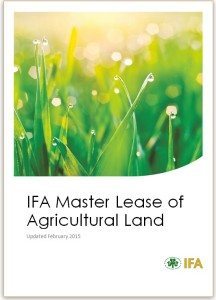Leasing Land
The IFA has developed a Master Lease of Agricultural Land to assist farmers in implementing land leasing agreements. It was updated in February 2015 and can be used between farmers for the purpose of setting up long-term lease agreements. Below is a user-friendly guide to the main issues involved in leasing land, and is not a legal interpretation of the taxation or legislative requirements.
There is no requirement for a solicitor or an auctioneer to be engaged to assist with the completion of or witness the lease agreements. However, any individual is free to engage a solicitor/advisor/tax consultant, to assist with the preparation of the lease.
The lease requires the signature of both farmers (lessor and lessee) involved and the signature of an independent witness.
No. The Master Lease is a comprehensive template document that provides many options for the individuals involved. Where a section of the lease is deemed to be not necessary by the two parties involved, it can simply be crossed out.
To qualify for the long-term income exemption scheme, the Revenue Commissioners have advised that a lease must contain the following:
A qualifying lease must be in writing or evidenced in writing, which
- contains the names and addresses of the lessor(s) and lessee(s),
- specifies the acreage, address, location etc. of the land which is the subject of the lease,
- sets out the terms of the lease, and
- is signed by the lessor(s).
The lease must be for a definite term of five years or more. The term of the lease should be expressly set out in the lease (or written memorandum).
Yes. Farmers, who have entered into land leasing agreements since 3rd April 2012 are now required to register the lease with the PSRA.
Registration of the lease is a legal requirement set out in Part 12 of the Property Services Regulation Act 2011 (Residential Property Sales Prices and Commercial Leases Database), whereby the PSRA is required to develop and maintain a Commercial Lease Register and tenants of a commercial lease (including land leases) are required to provide the PSRA with specific information on the commercial lease.
The tenant (or a third party authorised by the tenant) is required to provide the following information to the PSRA in respect of the lease agreement.
- The commencement date of the lease;
- The rent (if any) being paid for the lease;
- The frequency at which the rent will be reviewed for the land (if there is a rent review during the lease term);
- Particulars relating to who is liable (tenant/landlord) in respect of rates, insurance, service charges and repairs to the property;
- Particulars relating to any break-clause in the lease.
This information must be registered with the PSRA thirty days after commencement of the lease (i.e. within 30 days of receipt by the tenant of the stamp certificate from the Revenue Commissioners).
There is no fee for registering the information, which can be done online.
While the obligation is on the tenant (farmer) to register the lease, this can be done by a third party on behalf of the tenant, at the tenant’s request (e.g. solicitor, auctioneer, other party).
In Budget 2015, it was announced that there would be an exemption from stamp duty for leases of 6 years or more. However, this measure had to wait for EU State Aid approval, and so the relief did not come into effect until 1st August 2018.
Previously, all land lease agreements which comprise of a written document were liable for stamp duty. To avail of the relief now in place, the lessee must meet the following criteria:
- Have a relevant agricultural qualification (or gets the qualification within a period of 4 years from the date of execution of the lease)
OR
- Spend at least 50% of their normal working time on the farm (Revenue defines this as a minimum of 20 hours working on the farm a week, averaged over a year).
Also, the term of the lease must be for a period of at least 6 years and must not exceed 35 years.
The relief is claimed on a self-assessment basis, where the qualifying conditions for relief are satisfied; it must be filed through Revenue’s online system (ROS).
If the above criteria are not met and the relief cannot be availed of, stamp duty is then calculated as 1% of the average annual rent and is to be paid by the lessee. For example, if the annual rent payable on leased land is €10,000, Stamp Duty of €100 is liable.
The full amount of stamp duty has to be paid within 30 days of the date of execution of the instrument. In practice Revenue allow a further period of 14 days in which to file an e-stamping return and pay the duty. Failure to file and pay within 44 days resulted in late filing and interest charges.
For further and more detailed information see Revenue.
If you are leasing BPS entitlements with your land, you must notify the Department of Agriculture of this, to ensure that the entitlements remain in your name and revert to you at the end of the lease period. This is a straightforward process, and the form that must be filled out is available from here.

